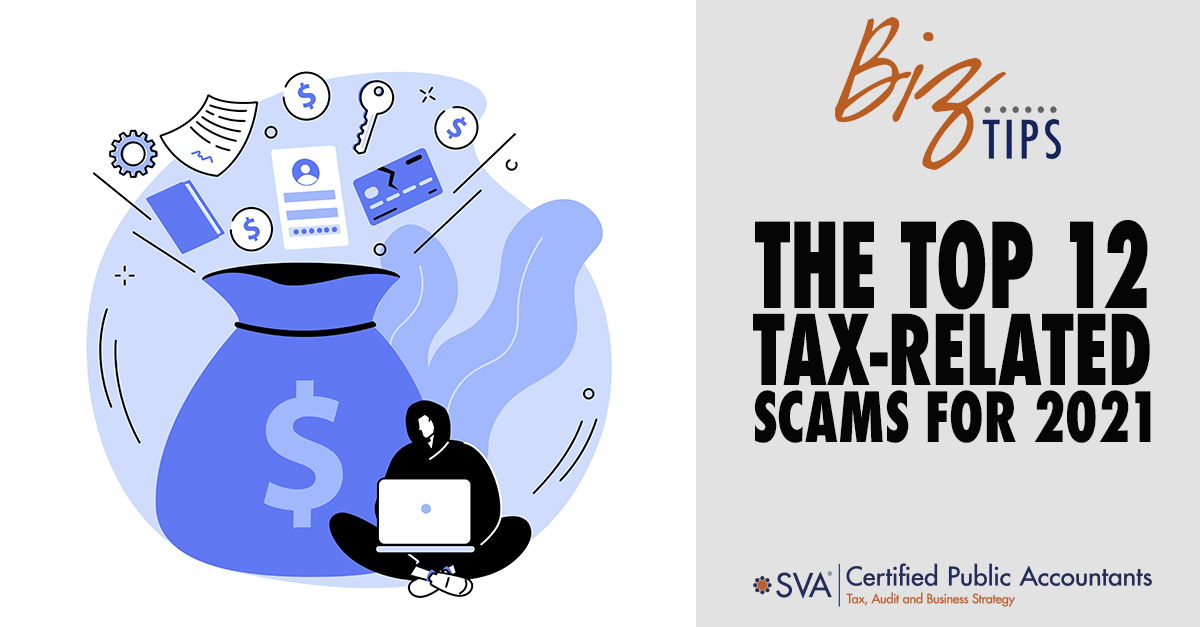

Published on: Sep 15, 2021 by Holly Eisenhauer, CPA
Updated on: May 16, 2022
Tax scams continue to be more sophisticated each year. To help warn taxpayers, tax professionals, and financial institutions, the IRS has released the "Dirty Dozen" list for 2021.
This year's "Dirty Dozen" is separated into four categories based on who perpetuates the schemes and who they impact.
The IRS urges all taxpayers to be on guard, especially during the pandemic, not only for themselves but also for other people in their lives.
"We continue to see scam artists use the pandemic to steal money and information from honest taxpayers in a time of crisis," said IRS Commissioner Chuck Rettig. "We provide this list to alert taxpayers about common scams that fraudsters use against their victims. At the IRS, we are dedicated to stopping these criminals, but it's up to all of us to remain vigilant to protect ourselves and our families."
This is an edited overview of the IRS Dirty Dozen from the IRS website. For more details on the IRS's "Dirty Dozen" list, view the special section of IRS.gov.
Identity thieves may try to steal stimulus payments, known as Economic Impact Payments (EIPs). The majority of payments are sent automatically from the IRS. Beware of text messages, random incoming phone calls, or emails inquiring about bank account information or requesting recipients to click a link or verify data. These should be considered suspicious and deleted without opening. The IRS won't initiate contact with you by text, social media, phone, or email and ask for personal information. If your check is coming through the mail, check your mailbox often to avoid mailbox theft.
The Form 1099-G reports unemployment compensation to individuals. If you receive this form and have not received unemployment compensation from your state, you may be a victim of this scam. Scammers also took advantage of the pandemic by filing fraudulent claims for unemployment compensation using the stolen personal information of individuals who had not filed claims. Payments made on these fraudulent claims went to the identity thieves. If you find yourself in this situation, contact your state agency and request a corrected form. You should complete your tax return timely and claim only the unemployment compensation you received. See Identity Theft and Unemployment Benefits for tax details and DOL.gov/fraud for state-by-state reporting information.
Tax-related identity theft starts with someone trying to obtain personal information through text messages, emails, or phone calls. The con artist will convince the recipient to give them Social Security numbers, credit card numbers, passwords, or bank account numbers. These scams often include a link that will download malicious software resulting in personal data being accessed.
Phishing scams target individuals with communications appearing to come from legitimate sources to collect victims' personal and financial data and potentially infect their devices by convincing the target to download malicious programs. Cybercriminals usually send these phishing communications by email but may also use text messages or social media posts. These communications might be disguised to look like they are from legitimate sources. Do not open attachments or click on links from any email that you aren't expecting to receive.
Social media provides the opportunity for the scammer to view accounts and extract personal information that can be used against the victim. These types of cons include impersonating family, friends, and co-workers of the victim. By pretending to be a person the victim knows, they send emails with malware links that infiltrate emails and cell phones. Beware when information is publicly shared on social media platforms as it can be collected and used by scammers. The IRS recommends you review privacy settings and limit the amount of personal information you share publicly.
The U.S. Treasury Financial Crimes Enforcement Network (FINCEN) has noted that ransomware attacks continue to rise across various sectors, particularly across governmental entities and financial, educational, and healthcare institutions. Ransomware attacks on small municipalities and healthcare organizations have increased, likely due to the victims' weaker cybersecurity controls such as inadequate system backups and ineffective incident response capabilities. Malicious software blocks access by encrypting data to extort ransom payments from victims in exchange for restoring access to their data.
Scammers take advantage of tragedies and disasters to set up fake organizations to collect donations from the unsuspecting and often generous public. Always research a charity before donating and do not feel pressured to give immediately. To check the status of a charity, use the IRS Tax Exempt Organization Search Tool.
Scammers will target seniors and those with limited English proficiency with threatening scams. Typically a taxpayer will receive a telephone call threatening deportation, revocation of a driver's license, or jail time. Taxpayers who are recent immigrants often are the most vulnerable and should ignore these threats and not engage the scammers. The IRS usually contacts people first through the mail, not over the phone, and legitimate IRS employees will never make threats such as the ones noted above.
"We're increasingly concerned that people having trouble paying their taxes are being duped into misleading claims about settling their tax debts for 'pennies on the dollar,'" said IRS Commissioner Chuck Rettig. "The IRS urges people to take a few minutes to review the information on IRS.gov to see if they might be a good candidate for the program – and avoiding costly promoters who advertise on radio and television."
The IRS reminds taxpayers to beware of promoters claiming their services are needed to settle with the IRS, that their tax debts can be settled for "pennies on the dollar," or that there is a limited window of time to resolve tax debts through the Offer in Compromise (OIC) program.
An "offer," or OIC, is an agreement between a taxpayer and the IRS that resolves the taxpayer's tax debt. The IRS has the authority to settle or "compromise" federal tax liabilities by accepting less than full payment under certain circumstances. However, some promoters are inappropriately advising indebted taxpayers to file an OIC application with the IRS, even though the advocates know the person won't qualify. This costs honest taxpayers money and time.
Although most tax preparers are ethical and trustworthy, taxpayers should be wary of preparers who won't sign the tax returns they prepare, often referred to as ghost preparers. For e-filed returns, the "ghost" will prepare the return but refuse to sign as the paid preparer digitally.
By law, anyone paid to prepare or assist in preparing federal tax returns must have a valid Preparer Tax Identification Number (PTIN). Paid preparers must sign and include their PTIN on the return. Not signing a return is a red flag that the paid preparer may be looking to make a quick profit by promising a big refund or charging fees based on the size of the refund. Taxpayers should also remember that they are legally responsible for what is on their tax return, even if it is prepared by someone else. Consumers can help protect themselves by choosing a reputable tax preparer.
Unemployment fraud often involves individuals acting in coordination with or against employers and financial institutions to get state and local assistance to which they are not entitled. These scams can pose problems that can adversely affect taxpayers in the long run.
States, employers, and financial institutions need to be aware of the following scams related to unemployment insurance:
The IRS warns people to be on the lookout for promoters who peddle false hopes of significant tax deductions from abusive arrangements. These "deals" are generally marketed by unscrupulous promoters who make false claims about their legitimacy and charge high fees to boot. These promoters frequently devise new ways to cheat the system and market them aggressively. Some taxpayers play the audit lottery, hoping they don't get noticed.
In syndicated conservation easements, promoters take a provision of tax law for conservation easements and twist it through using inflated appraisals of undeveloped land and partnerships. These abusive arrangements are designed for gaming the system and generating exaggerated and unwarranted tax deductions, often by using inflated appraisals of undeveloped land and partnerships devoid of a legitimate business purpose. For more information, read the article IRS Increases Enforcement Action on Syndicated Conservation Easements.
In abusive "micro-captive" structures, promoters, accountants, or wealth planners persuade owners of closely-held entities to participate in schemes that lack many of the attributes of insurance. For example, coverages may "insure" implausible risks, fail to match genuine business needs, or duplicate the taxpayer's commercial coverages. But the "premiums" paid under these arrangements are often excessive and used to skirt tax law.
Some U.S. citizens and residents are relying on an interpretation of the U.S.-Malta Income Tax Treaty to take the position that they may contribute appreciated property tax-free to specific Maltese pension plans and that there are also no tax consequences when the plan sells the assets and distributes proceeds to the U.S. taxpayer. Ordinarily, the gain would be recognized upon disposition of the plan's assets and distributions of the proceeds. The IRS evaluates the issue to determine the validity of these arrangements and whether Treaty benefits should be available in such instances and may challenge the associated tax treatment.
Improper claims for the research and experimentation credit generally involve failures to participate in, or substantiate, qualified research activities and/or satisfy the requirements related to qualified research expenses. To claim a research credit, taxpayers must evaluate and appropriately document their research activities over a period of time to establish the amount of qualified research expenses paid for each qualified research activity. Taxpayers should carefully review reports or studies to ensure they accurately reflect the taxpayer's activities.
Promoters find taxpayers seeking to defer the recognition of gain upon selling appreciated property and organize an abusive shelter by selling them monetized installment sales. These transactions occurred when an intermediary purchases appreciated property from a seller in exchange for an installment note, which typically provides for payments of interest only, with principal being paid at the end of the term. In these arrangements, the seller gets the lion's share of the proceeds but improperly delays the gain recognition on the appreciated property until the final payment on the installment note, often slated for many years later.
This is an edited overview of the IRS Dirty Dozen from the IRS website. For more details on the IRS's "Dirty Dozen" list, view the special section of IRS.gov.
© 2021 SVA Certified Public AccountantsShare this post:

Holly is a Principal with SVA Certified Public Accountants and specializes in individual taxation with a focus on proactive tax planning and developing strategies to minimize current and future tax liabilities.
Get Weekly Biz Tips Delivered Straight to Your Inbox!
Services
Madison, WI
1221 John Q Hammons Dr, Suite 100
Madison, WI 53717
(608) 831-8181
Milwaukee, WI
18650 W. Corporate Drive, Suite 200
Brookfield, WI 53045
(262) 641-6888
Colorado Springs, CO
10855 Hidden Pool Heights, Suite 340
Colorado Springs, CO 80908
(719) 413-5551

Are you in the know on the latest business trends, tips, strategies, and tax implications? SVA’s Biz Tips are quick reads on timely information sent to you as soon as they are published.
Copyright © 2026 SVA Certified Public Accountants | Privacy Policy | Cookie Policy | CCPA